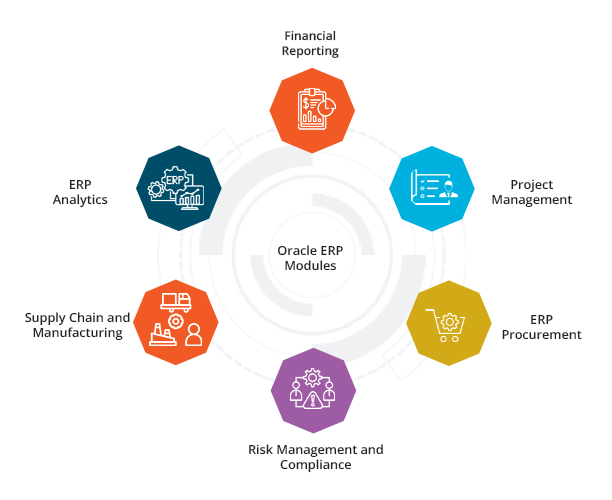Oracle ERP Implementation: Best Practices and Success Factors
- July 20, 2023
- Posted by: shakil
- Categories: ERP, Software

Introduction:
Enterprise Resource Planning (ERP) systems have become essential tools for businesses seeking to streamline their operations and enhance overall efficiency. Oracle Corporation, a global leader in enterprise software solutions, offers a robust suite of ERP applications designed to meet the diverse needs of organizations across industries. However, successful Oracle ERP implementation requires careful planning, diligent execution, and a commitment to best practices. In this article, we will explore the key steps and success factors that contribute to a successful Oracle ERP implementation.
1. Comprehensive Planning and Analysis:
Before embarking on an ERP implementation journey, organizations must conduct a thorough assessment of their current processes, systems, and requirements. This involves understanding the specific goals, pain points, and objectives of the business. Identifying the scope of the ERP implementation and defining key performance indicators (KPIs) will provide a clear roadmap for the project.
2. Top-Down Support and Stakeholder Engagement:
A crucial element for the success of any ERP implementation is obtaining strong support from the top management. Leadership commitment ensures that the project receives adequate resources, including budget and human capital. Additionally, involving key stakeholders from different departments during the planning phase fosters better alignment of business needs with the ERP solution.
3. Customization vs. Configuration:
Oracle ERP offers a wide array of modules and functionalities that can be tailored to suit an organization’s unique requirements. However, it is essential to strike a balance between customization and standard configuration. Over-customization may lead to complexities during implementation, upgrades, and maintenance. Emphasize configuring the system to leverage its standard features as much as possible before considering customization.
4. Data Cleansing and Migration:
Data is the backbone of an ERP system, and clean, accurate data is essential for a successful implementation. Before migration, organizations must conduct a rigorous data cleansing process to eliminate duplicate, outdated, or inaccurate information. Additionally, they should establish data migration strategies and conduct thorough testing to ensure the data is transferred seamlessly.
5. Phased Implementation Approach:
Dividing the ERP implementation into manageable phases helps reduce risks and ensures that each stage is adequately tested before proceeding to the next. This approach allows for flexibility and the ability to learn from previous phases, making adjustments as needed. Moreover, it helps to build confidence in the system’s functionality and performance gradually.
6. Robust Training and Change Management:
Employee buy-in is critical to the success of an ERP implementation. Comprehensive training programs should be conducted to equip users with the necessary skills and knowledge to use the ERP system effectively. In addition, implementing change management strategies to address resistance and foster a culture of adaptability will smoothen the transition process.
7. Continuous Testing and Quality Assurance:
Thorough testing and quality assurance are imperative throughout the implementation journey. Rigorous testing helps identify and rectify issues early on, preventing potential disruptions during the go-live phase. Comprehensive test scenarios should cover various business processes and involve end-users to ensure the system meets their operational needs.
8. Post-Implementation Support and Optimization:
The journey doesn’t end with the ERP system’s go-live. Post-implementation support and ongoing optimization are crucial to realizing the full potential of the Oracle ERP solution. Regular system audits, user feedback, and performance monitoring aid in identifying areas that require improvement, system updates, and additional training.
Conclusion:
Implementing an Oracle ERP system can be a transformative step for businesses seeking operational excellence and streamlined processes. By following best practices and embracing the key success factors outlined in this article, organizations can increase the likelihood of a successful Oracle ERP implementation. With careful planning, stakeholder engagement, and a commitment to continuous improvement, businesses can harness the power of Oracle ERP to drive efficiency, growth, and competitive advantage in today’s dynamic business landscape.
Contact OTSL today to learn more about their Oracle ERP implementation services and how they can support your organization’s unique needs. OTSL is the only software company in Chittagong,Bangladesh who provide On Demand Customizable Software solution for the Medium & Large Enterprises.
OTSL(Oracle Technology Software and Learning, MM Tower, CDA Avenue, Panchlaish, Chittagong, Bangladesh.
Best software company in Chittagong,Best software company in Ctg,Best software company in Chattogram,Best software company in Feni,Best software company in Coxesbazar,Best software company in Dhaka,Best software company in Bangladesh, info@otsl-ctg.com, 01743333392
